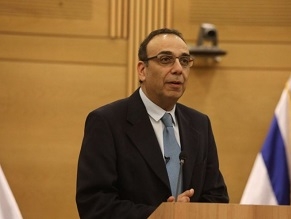|
World Jewish News

GPO Director Nitzan Chen: ''Freedom of the press is one of the cornerstones of the Government Press Office, but we will not accept a situation in which an official certification issued by the State of Israel will serve as a tool for those who ex
|
‘Freedom of the press in Israel is one of the cornerstones of the Government Press Office’, Media credentials of Al Jazeera corr
31.08.2017, Israel "Freedom of the press is one of the cornerstones of the Government Press Office (GPO),’’ said its director, Nitzan Chen, as he explained his decision to not revoke the media credentials of the correspondent in Israel of the Qatari-funded Al Jazeera channel.
Chen’s decision is based on the findings of a hearing of the journalist, Elias Karam, at the Government Press Office in Jerusalem, who made ‘’unequivocal remarks,’’ as well as other checks conducted in recent days, including in coordination with the security agencies.
The GPO Director stated: "Freedom of the press is one of the cornerstones of the Government Press Office, but we will not accept a situation in which an official certification issued by the State of Israel will serve as a tool for those who exploit it for public struggle against the country. Unfortunately, there have been reports lately, on Al Jazeera television network, which do not meet factual, public and professional standards.’’
He added: "In the coming months, the GPO will monitor the network's reports in Israel, in Arabic and in English, and will not hesitate, after consultation with legal and security agencies, to draw necessary conclusions."
In the hearing, held last week, the Al-Jazeera journalist made it clear that, contrary to what was implied in a television interview, he did not see himself as part of the Palestinian "resistance" to the State of Israel.
‘’In light of his unequivocal remarks, the Government Press Office has decided not to immediately revoke Karam's GPO card, and in the next six months to monitor his reports in Al-Jazeera in order to ensure that his clear statements are reflected in his actual journalistic work and were not mere words,’’ the GPO said.
In his statement, Chen quoted Karam’s defense extensively. “In his professional work as a news reporter, he testifies to have adopted a ‘golden rule,’ according to which ‘one should not mix opinion with reporting,’ and thus he conducts himself as a journalist,” Chen said. “He also stressed that he does not see his role as a journalist in taking any position, either for or against one resistance or another, and advocates ‘completely objective reporting, presenting reality as it is without interfering in it or without being part of it or influencing it.'”
Chen’s decision follows last month’s statement by Israeli Prime Minister Benjamin Netanyahu accusing Al Jazeera of “incitement” and expressing his desire to close down the Israel bureau run by Karam, who is an Arab Israeli. Israeli Communications Minister Ayoub Kara said on August 6 that he would examine closing the bureau, prompting furious protests from Al Jazeera itself, as well as human rights group Amnesty International, which slammed Israel’s “brazen attack on media freedom.”
Al Jazeera, which operates Arabic and English-language channels, has frequently been accused of promoting anti-Semitism and extreme anti-Zionism. The station has provided a platform for a number of anti-Semitic Islamist preachers, among them the spiritual head of the Muslim Brotherhood, Yousef al-Qaradawi, who described the Nazi Holocaust as “divine punishment” imposed on the Jews during an Al Jazeera broadcast. Qaradawi is based in the Qatari capital, Doha.
Though it describes itself as an independent broadcaster, Al Jazeera — whose parent company is owned by Sheikh Hamad bin Thamer bin Mohammed Al Thani of the Qatari royal family — shies away from critical reporting of Qatar itself. A 2016 report on media freedom in Qatar by Freedom House observed that, “while the country’s flagship satellite television channel, Al Jazeera, is permitted to air critical reports on foreign countries and leaders, journalists are subject to prosecution for criticizing the Qatari government, the ruling family, or Islam.”
The Freedom House report cited examples of journalists detained by the Qatar authorities last year — among them a BBC crew who were reporting on the horrific working conditions experienced by thousands of migrant workers brought into Qatar under its kafala system, likened by many human rights activists to a form of slavery. Ninety-four percent of Qatar’s population of 2.1 million is composed of migrants from countries such as Nepal, Bangladesh and Sri Lanka.
Across the Arab world, Al Jazeera has over the last decade been the target of draconian bans and closures imposed by Arab censors in a number of countries, including Algeria, Egypt and Iraq. In May, the Egyptian authorities announced a ban on 21 websites, including Al Jazeera.
Al Jazeera is also at the centre of the feud pitting Saudi Arabia against Qatar, its super-rich neighbour. Several Arab countries, including Egypt and the United Arab Emirates (UAE), have joined the Saudis in isolating the tiny monarchy over its support for terrorism and its ties to Iran. But what really irks them is how Qatar has used Al Jazeera to wield outsize influence in the region. They see it as a propaganda tool, promoting an agenda often at odds with their own.
The coalition is demanding that Qatar close Al Jazeera, and agree to 12 other conditions, before dropping their blockade.
EJP
|
|
